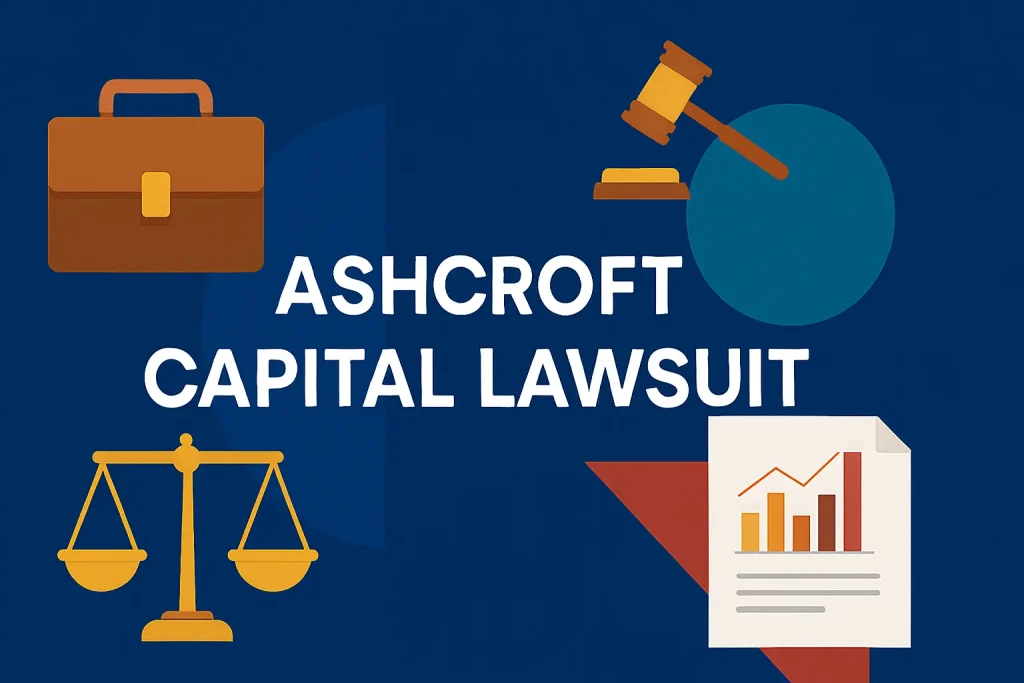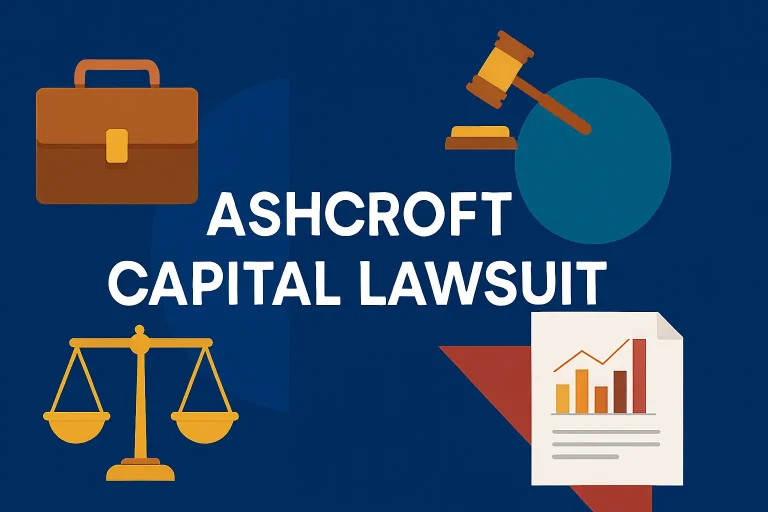
In the world of private equity real estate, trust is everything. Ashcroft Capital, co-founded by Joe Fairless, once stood as a symbol of innovation and growth within the multifamily syndication space. But today, it finds itself at the center of a rapidly unfolding legal saga. The Ashcroft Capital lawsuit has sparked widespread attention across the U.S. real estate market, raising serious concerns around transparency, fiduciary duty, and regulatory compliance.
As allegations mount and investors seek clarity, it’s essential to understand what’s truly happening. This article breaks down the case, addresses investor concerns, and offers expert guidance on protecting your interests in today’s complex investment environment.
What Is the Ashcroft Capital Lawsuit?
At the heart of the Ashcroft Capital legal action is a growing class of passive investors who claim they were misled. These individuals have come forward alleging serious misconduct, from financial misrepresentation to sponsor misconduct and beyond. The lawsuit, which remains active, may shape the future of real estate syndication companies and how they interact with stakeholders.
The dispute isn’t just about money—it’s about trust, transparency, and responsibility. With investment fund mismanagement and SEC compliance in question, the Ashcroft Capital controversy has quickly evolved into a defining moment for the firm and the broader industry.
Also Read: https://gossipsmag.co.uk/andre-hakkak-wife/
Timeline of Legal Disputes Involving Ashcroft Capital
- Q1 2023: Passive investors report missed returns and discrepancies in financial statements.
- Q2 2023: Legal firms involved begin filing class action paperwork.
- Q3 2023: Media outlets publish reports on Ashcroft Capital’s alleged fund mismanagement.
- Q4 2023: Ashcroft Capital issues a formal public response denying wrongdoing.
- Q1 2024: Lawsuit officially filed, naming Joe Fairless and Ashcroft Capital as defendants.
- Present: Proceedings continue, with new details emerging regarding performance disclosure and fiduciary breaches.
Investor Allegations Against Ashcroft Capital
Investors have voiced several grievances, most notably surrounding inaccurate return forecasts and poor communication. They argue that the investment projections shared by Ashcroft Capital painted an overly rosy picture—one that never aligned with real-world outcomes.
Furthermore, they allege that key risks tied to these investments were either downplayed or not disclosed at all. These concerns reflect deeper issues of sponsor misconduct and poor investor transparency, both of which are central to the pending legal proceedings.
Claims of Misrepresentation in Projected Returns
Many investors allege that Ashcroft Capital significantly overstated projected earnings. These returns, they claim, failed to consider changing market dynamics and interest rate hikes. Such misrepresentations fall under the scope of financial misrepresentation—a serious charge that damages investor trust.
This raises important questions around performance disclosure. Did the firm knowingly exaggerate numbers? Or were these simply miscalculations in a volatile real estate market? Either way, the consequences are now playing out in court.
Alleged Breach of Fiduciary Responsibility
Fiduciary duty is a foundational element in any investor-sponsor relationship. According to the lawsuit, Ashcroft Capital failed to uphold this responsibility. By prioritizing acquisition fees and distributions over investor returns, plaintiffs allege that Ashcroft breached their ethical and legal obligations.
Such a breach of fiduciary duty threatens the credibility of all real estate investment firms. For investors, it underscores the importance of choosing sponsors who put transparency and long-term value above short-term gain.
Transparency Concerns and Withheld Disclosures
One of the most striking allegations is the lack of consistent financial reporting. Investors claim that quarterly updates were delayed or omitted altogether, especially when returns began to underperform. In an industry built on trust, silence can speak volumes.
This withholding of information suggests more than just poor communication—it implies systemic issues. Transparency lapses affect not just investor confidence but also compliance with SEC guidelines, making it a key area of concern.
Accusations of Investment Fund Mismanagement
- Use of investor funds on projects outside the original scope.
- Lack of proper diversification, increasing exposure to risk.
- Failure to adjust strategy amid changing economic conditions.
- Poor oversight and risk controls at the executive level.
- Ignoring warning signs that pointed to unsustainable performance.
These accusations, if proven, would constitute a serious case of investment fund mismanagement. They further reinforce the need for stringent internal controls and independent audits within private equity real estate firms.
Did Ashcroft Capital Violate Regulatory Standards?
Another central issue in this legal saga is regulatory compliance. The lawsuit alleges that Ashcroft Capital may have violated several SEC standards, particularly those related to disclosure and fair dealing. Though the SEC has not formally charged the company, scrutiny has intensified.
Private equity firms operate under a complex web of regulations. Any violation, intentional or otherwise, can trigger investigations, penalties, and long-lasting reputational harm. The stakes are high—and not just for Ashcroft Capital.
Market Volatility vs. Management Shortcomings: Who’s to Blame?
To be fair, some of the firm’s underperformance could be attributed to broader market factors. The U.S. real estate market has been heavily impacted by inflation, interest rate hikes, and post-COVID turbulence. These conditions have hurt even the most seasoned investors.
Still, many argue that sound management should account for such risks. This brings us back to real estate syndicator accountability. Did Ashcroft’s team fail to prepare for market volatility? Or was their strategy inherently flawed from the start?
Ashcroft Capital’s Official Response to the Lawsuit
Ashcroft Capital and Joe Fairless have both denied any wrongdoing. They insist that all projections were based on reasonable assumptions and that any underperformance resulted from uncontrollable economic changes—not internal mismanagement.
In their public statements, they reaffirm their commitment to ethical practices and investor well-being. However, critics argue that actions speak louder than words, and the courtroom may ultimately reveal which side is telling the truth.
Legal Experts Weigh In on the Case’s Implications
Legal professionals see this lawsuit as a potential turning point. If the courts rule against Ashcroft Capital, it could set a precedent for holding real estate sponsors more accountable. That would be a win for investor rights across the board.
Experts also stress the importance of increased regulatory oversight. With more investors entering the passive real estate space, clearer rules and enforcement mechanisms are essential to protect capital and confidence.
How This Lawsuit Impacts Passive Real Estate Investors
- Possible loss of invested capital and delayed returns.
- Erosion of trust in multifamily syndication models.
- Greater scrutiny over private equity real estate deals.
- Demand for improved reporting standards and communication.
- Legal recourse becoming a last resort for aggrieved investors.
This legal action could reshape how passive investors evaluate deals. It may drive increased diligence, lower risk tolerance, and more thoughtful sponsor selection moving forward.
Lessons for Future Investors in Syndicated Real Estate Deals
The Ashcroft Capital lawsuit offers valuable lessons. Investors must never rely solely on past performance or charismatic leadership. Deep due diligence, third-party audits, and legal reviews are essential before wiring a single dollar.
Also, demand transparency upfront. Ask about worst-case scenarios, contingency plans, and exactly how your money will be used. Trust your gut—and back it up with facts.
What This Means for Real Estate Syndication Firms
- Need to implement better risk management policies.
- More thorough investor disclosures and updates.
- Reputational risk now carries financial consequences.
- Institutional investors may demand stricter compliance.
- Smaller firms may struggle to meet new transparency expectations.
This case sends a clear message to the industry: the days of vague promises and minimal reporting are over. Real estate syndication firms must now rise to a new standard.
Potential Outcomes and Legal Ramifications
Should Ashcroft Capital lose the case, financial penalties could follow, along with tighter SEC regulations. More importantly, a guilty verdict would validate concerns raised by passive investors and empower others to speak out.
If they prevail, however, it could reinforce the idea that market turbulence—not mismanagement—is the real villain. Either way, the decision will shape the future of real estate investment lawsuits.
How to Perform Better Due Diligence Before Investing
- Verify sponsor track record through independent sources.
- Ask for detailed financial models and risk assessments.
- Review legal documents with a real estate attorney.
- Monitor communication frequency and transparency.
- Check for third-party audits and compliance history.
Smart investing starts with smart questions. In the wake of this controversy, investors are wise to elevate their standards and seek deeper insights into every deal.
Frequently Asked Questions
Q: Who is Joe Fairless?
A: Joe Fairless is the co-founder of Ashcroft Capital and a notable figure in multifamily real estate investing.
Q: Is this a class action lawsuit?
A: Yes, it involves a growing group of passive investors filing jointly against Ashcroft Capital.
Q: Has the SEC filed formal charges?
A: As of now, the SEC has not formally charged Ashcroft Capital, though compliance concerns are part of the broader discussion.
Q: What’s the worst-case scenario for investors?
A: Investors could face capital loss and delayed distributions, but legal outcomes remain pending.
Q: Should I avoid all real estate syndications now?
A: Not necessarily. This case highlights the need for stronger due diligence, not the rejection of syndication altogether.
Final Thoughts
The Ashcroft Capital lawsuit is more than just a legal matter—it’s a wake-up call for the entire real estate investment community. Whether you’re a passive investor or a syndicator, the message is clear: accountability, transparency, and trust are non-negotiable.
As the U.S. real estate market evolves, only those who operate with integrity will thrive. The rest, as this case reminds us, will face consequences. Stay informed, stay protected, and always demand more from those who manage your capital.





